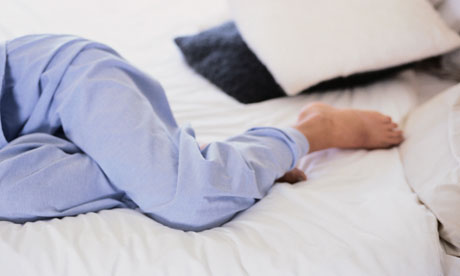
When I got the date for my sex reassignment surgery, I wasn't so worried about the operation itself (I'd be asleep, right?) as its aftermath: how I was going to look after myself during the two months it would take to recover? I called my parents and immediately my mother offered to take care of me at the family home. I'd never felt so glad or relieved: the Gender Identity Clinic suggest full-time care for at least the first two weeks, and getting it from my parents (especially my mother, a former district nurse) meant that they would be reassured that I was fine, while I would benefit from rest, relaxation and plenty of home cooking.
The day after my discharge from Charing Cross Hospital, my father drives me back to Horley, Surrey, where I will convalesce in my old bedroom. As he does so, the post-surgical pain increases dramatically. I try to be stoic: it isn't going away for some time, so I decide to get through the journey, sleep and see how I feel in the morning. Much worse, is the answer: the sight and smell of the neovagina instantly confirms that I've contracted an infection.
My father takes me to the nearest Urgent Treatment Centre. The nurse has never encountered my circumstances before, and warns that as the Accident & Emergency unit at East Surrey Hospital may not be able to treat me, I might need to return to Charing Cross. This would mean a long drive back to London in searing heat, two days before the Olympics. I hold back tears as we contact the GIC's nurse specialist, who says that this is not uncommon and can be handled with antibiotics. After inspection by a senior doctor, who says that the bruising above the wound has become infected, I am sent home with new medication.
The following Monday, the addition of new drugs to my painkiller regime completely floors me - and my energy was already low as my body strived to heal itself. I spend the entire afternoon in bed, having slept little at night due to the pain and the pills, which warp my dreams into vivid nightmares for weeks after the operation. My mother and I decide to stop the antibiotics slightly early; from there, my recovery is slow, but steady.
My movement is limited, as lying down hurts far less than sitting, but it does at least provide quiet time to read and watch films. My mother encourages me to go outside, but 10 days after surgery I can barely reach the top of our road. There are sharp pains as nerve endings reconnect; a dull, throbbing ache and an unbearable pushing sensation at the base of the affected area, which stay constant for weeks; and plenty of discharge for the first month. This is alleviated by regular baths, which are pleasant but boring.
To pass the time, I listen to the radio: one afternoon, the DJ plays Joy Division's Love Will Tear Us Apart, which was constantly on my stereo during my alienated youth. As I hear its opening bars, the entire transition, from my childhood gender dysphoria to this pain-filled moment in the house where I grew up, 20 years later, replays itself in my mind, and suddenly I'm in waves of cathartic tears.
"And yet there's still this appeal that we've kept through our lives …"
This feels like a watershed: gradually things improve. Being with my parents changes my relationship not just with them, but my home town. One day a friend visits and I take her on a tour: with just an afternoon and almost incapacitated, I still manage to show her the entire centre twice. My favourite feature is the sign in the bookshop: "Look! Fifty Shades of Grey in stock now." I dread to imagine the letters to the local paper.
Three and a half weeks post-surgery, I take another friend to watch Horley Town play Holmesdale in the FA Cup. We stand behind the goal and when Horley's winger shanks a cross into touch, I'm nearest the ball. Instinctively I run to throw it back. I soon wish I hadn't, remembering that the pain will take weeks if not months to disappear completely.
Mentally, it's a strange time too. At first the discomfort and discharge stop me from forming a positive relationship with my altered body, and my constant urge to be active sits badly with my inability to walk more than a few hundred metres. Further constrained by the need to dilate three times daily, watching the world pass by on Twitter and television, I remind myself that this is temporary: soon, I can put it all behind me.
Coming back to London, I slowly step up my activity, meeting friends in local cafes and testing my pain barrier in going to watch Norwich City start the season at Fulham. Despite City's abject hammering, it feels wonderful to return to one of the mainstays of my social life.
Just as importantly, I start to familiarise myself with my changed body, getting used to the sight of it in the mirror. Then, after several weeks, the dilation stops being painful and becomes pleasurable, at least at times – the discovery of sexual sensation is another huge landmark, and finally I'm excited not just about returning to my pre-surgical normality but about discovering a post-surgical one.
Two months after surgery, I make a final, brief visit to the surgical team at the Clinic, who check my health and administer some silver nitrate to deal with the granulation tissue that has developed during the healing process. Before I leave, I schedule my last appointment with the psychiatric team, where we can address the final question: how do I feel?

